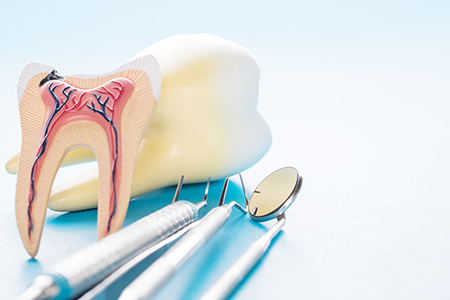
If your dentist recommends a root canal, there’s no reason to panic. Modern root canal therapy is a predictable, comfortable treatment that routinely relieves tooth pain and preserves teeth that would otherwise be lost. In many cases, a root canal is the least invasive way to treat deep decay or injury and to keep your natural smile intact.
At the office of Caring Bear Dental, we combine up-to-date technology with patient-centered care to make root canal treatment as efficient and stress-free as possible. Comfort, clear communication, and long-term oral health are the priorities that guide every decision we make.
Keeping your natural tooth whenever feasible offers benefits that go beyond appearance. A living tooth helps preserve the surrounding jawbone, maintains proper chewing function, and supports the alignment of neighboring teeth. When a tooth’s internal tissues are irreversibly damaged, root canal therapy removes the source of infection and allows the tooth to remain in place and function for years to come.
Success rates for contemporary root canal treatment are high, thanks to improved instruments, better materials, and advanced imaging. For most patients, a treated tooth provides reliable function and comfort comparable to an untreated tooth. Choosing to preserve rather than replace a tooth often reduces the need for more extensive procedures later.
Extraction is sometimes necessary, but it’s important to understand the alternatives. Replacing a removed tooth typically involves additional treatments such as implants, bridges, or removable appliances — each with its own trade-offs. In many cases, a successful root canal followed by a well-designed restoration is the most conservative path to a stable, long-term outcome.

At the heart of every tooth is the dental pulp: soft tissue that contains nerves and blood vessels. The pulp helps the tooth develop, but once a tooth is fully formed it can survive without an active pulp. When bacteria reach the pulp through deep decay, cracks, or trauma, inflammation or infection can follow and produce symptoms that signal the need for treatment.
Symptoms vary widely. Some people experience sharp or throbbing pain, others notice a lingering sensitivity to hot or cold, and some have swelling or a persistent bad taste. In other cases there may be little or no pain, and the problem is spotted on a routine exam or X-ray. Because symptoms are not always obvious, timely dental evaluation is important when you notice any change in a tooth.
Left untreated, an infected pulp can cause spreading infection and damage surrounding bone. Root canal therapy removes the diseased tissue, disinfects the canals, and seals them to prevent reinfection — a targeted way to stop the problem while keeping the tooth in place.
Although not every instance of dental discomfort indicates the need for root canal therapy, some warning signs that should prompt an evaluation include the following:
Continuous, worsening toothache — especially pain that wakes you at night or lingers after stimuli are removed — often points to deep decay or nerve involvement. This type of persistent pain is a common indication that the tooth’s inner tissues are compromised.
Prolonged sensitivity to hot or cold foods and drinks that does not improve when the stimulus is removed can mean that the pulp is inflamed or damaged. This sensitivity may be intermittent at first and become more constant as the condition progresses.
If chewing or even lightly tapping the tooth causes discomfort, the nerve or surrounding tissues may be affected. This pain can indicate a crack, deep decay, or an infection that has reached the pulp or periodontal tissues.
A tooth that turns darker or grayish after an injury may have internal bleeding or pulp necrosis. Discoloration is a visible sign that the internal tissues are no longer healthy and should be evaluated by your dentist.
Structural trauma can expose the pulp to bacteria or disrupt its blood supply. Even small fractures that don’t seem painful at first can allow infection to develop over time, making early assessment important.
Swelling around a tooth or a small pimple-like lesion on the gum (a draining abscess) suggests that infection has spread beyond the pulp. Prompt treatment prevents the infection from advancing and addresses uncomfortable symptoms.
When the supporting bone or ligament is affected by infection or inflammation, a tooth may feel loose. Root canal therapy can halt the destructive process and allow healing when performed in a timely manner.

Some teeth with pulp damage show clear symptoms, while others remain quiet for months. Routine dental exams and radiographs often detect early signs of trouble before pain begins. When problems are identified early, treatment is generally simpler, less invasive, and more predictable.
Delaying care can allow infection to worsen, which may require multiple visits or additional procedures to resolve. In advanced cases, an infection can spread into surrounding tissues, creating more complex challenges. Early assessment and a timely treatment plan help protect not only the affected tooth but your overall oral health.
Your dentist will weigh factors such as the tooth’s restorability, the extent of infection, and the condition of surrounding bone to recommend the best path forward. In many situations, prompt root canal therapy can restore comfort and function while avoiding the need for extraction.
Root canal therapy today is much different than the procedures of the past. Local anesthesia reliably controls pain, and improved instruments plus enhanced magnification allow dentists to clean and shape the canals more thoroughly. The objective is to remove diseased tissue, disinfect the internal spaces, and seal them to prevent reinfection.
Treatment may be completed in a single appointment for straightforward cases; more complex situations or active infections sometimes require two or three visits. During the procedure, an access is made through the crown of the tooth, the canals are cleaned and shaped with precision instruments, and a biocompatible filling material is placed to seal the space.
Sedation options are available for patients who experience anxiety. Depending on individual needs, your dentist can discuss choices that help you feel relaxed during the visit. After the root canal, a durable restoration — often a crown — is recommended to protect the tooth and restore full function.

Comfort and clarity are priorities after treatment. Most patients notice immediate relief from the severe pain that prompted care, though mild soreness around the treated tooth is common for a few days. Over-the-counter pain relievers generally manage this discomfort, and your dentist will advise specific aftercare and prescribe medication if needed.
Even with a successful root canal, the treated tooth is more fragile until it is fully restored. A temporary filling is often placed initially, and a permanent crown or appropriate restoration should follow to rebuild strength, prevent fracture, and restore normal chewing function.
Continuing good oral hygiene and regular dental visits are essential to protect the treated tooth and the rest of your mouth. When cared for properly, a root canal–treated tooth can remain functional for many years — often for a lifetime.
Anesthesia may leave the treated area feeling numb for an hour or more. Take care not to bite your cheek, lip, or tongue until sensation returns to avoid accidental injury.
Mild tenderness is common as surrounding tissues recover. This typically fades over a few days. Your dentist will explain appropriate over-the-counter remedies and when prescription medications are warranted.
If an antibiotic is prescribed to address an infection, it’s important to take the medication exactly as directed and to finish the entire course even if symptoms improve.
Until a permanent restoration is placed, avoid chewing hard or sticky foods on the treated side. A crown or onlay will restore the tooth’s strength and reduce the risk of fracture.
Brushing and flossing support healing and help prevent new decay. Keeping routine dental appointments ensures the restoration and surrounding tissues remain healthy.
A permanent crown or other final restoration protects the tooth and restores confident function. Your dentist will recommend the right timing and restorative option for your situation.
With thoughtful care and appropriate restoration, a tooth treated with root canal therapy can provide reliable service for many years. Monitoring and routine dental care help preserve the result and detect any issues early.
At the office of Caring Bear Dental, our team is committed to clear explanations, gentle treatment, and long-term outcomes that keep you comfortable and fully functional. If you have questions about root canal therapy or think you may need an evaluation, please contact us for more information.
A root canal procedure is the best way to save a tooth that has been damaged by decay or injury and preserve your natural smile. The alternative is an extraction and treatment to replace the tooth. While at times a tooth is non-restorable and an extraction is the only option, when possible, it’s best to try and save your natural tooth. With proper care, a tooth with root canal therapy can serve your smile well for many years to come.
Despite lingering myths from before the age of modern dental anesthesia and technology, having a root canal procedure today is as routine and comfortable as visiting the dentist for a filling. While the procedure is performed under local anesthesia with your tooth completely numbed, we can also discuss options in dental sedation.
Whether the symptoms of a dental infection subside after a course of antibiotics, a draining abscess provides you with some temporary pain relief, or a tooth with radiographic evidence of pathology has not yet developed symptoms, it’s essential, before an infection worsens or occurs, to have a root canal procedure performed. In this way, the tooth can be disinfected, filled, and sealed to protect your health and avoid further problems.
If you have sustained a dental injury, have a toothache, jaw pain, swelling, or are experiencing any other unusual and uncomfortable oral symptoms, contact our office immediately for care. Dental problems that have not been evaluated and treated can significantly worsen, producing more severe damage and consequences for the involved teeth, your oral health, and even your overall wellbeing. Once you get in touch with our office, our friendly and compassionate office team will get you in for care at your earliest convenience.
While some root canal procedures can be completed in one visit, others may involve 2 or 3 appointments. How long it takes depends on various factors, including active infection, the number of canals in the tooth, and the tooth’s location or anatomy.
With a success rate that exceeds 95%, root canal therapy remains the most effective procedure to save a tooth in which the inner vital tissues have been damaged. However, as with all healthcare procedures, there are a small percentage of cases where the teeth become symptomatic a second time. The good news is that many of these teeth can still be saved with root canal retreatment or a minor surgical procedure known as an apicoectomy.
The best ways to maintain a tooth with root canal therapy are to get the proper restoration required to rebuild and protect the tooth, maintain proper oral hygiene, and schedule appointments for routine dental checkups and care.
Saving a tooth with root canal therapy is a wise investment that, in the long run, is typically less costly and invasive than having the tooth extracted and replaced with a fixed bridge or implant. As far as the exact cost of care, it can vary depending on which tooth is being treated. Many dental insurance plans provide coverage for root canal therapy. At the office of Caring Bear Dental, we do our best to optimize your dental benefits and minimize your out-of-pocket expenses. Our staff will answer all your questions about the cost of care and discuss all your payment options.
At the office of Caring Bear Dental, we use the latest technology and most effective methods of care to provide precise and gentle care. Our reputation for excellence is based upon a consistent record of achieving successful treatment outcomes while providing prompt, stress-free, and convenient treatment for every type of dental need.
